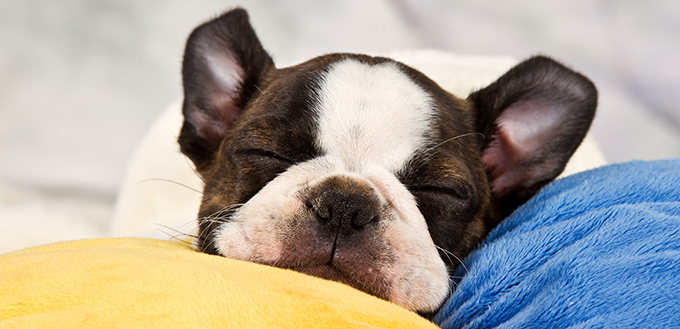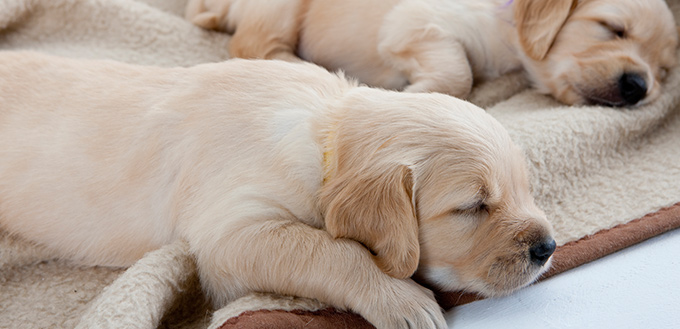Monday morning is the time when most people suffer from blues, especially when it comes to waking up early to go to work. At a time like this, a nudge from a furry friend is truly welcome and it propels you into action. However, much of this appreciation is short-lived when you glace wistfully at your canine curled up on the rug or under the table taking one of its naps while you need to face the day. You feel further aggravated when, on coming back from work, the pooch is still snoozing blissfully. It makes you wonder – why does my dog sleep so much?
The good news is that you are not alone in this world to be posing this question. In fact you can rest assured that sooner or later this question is bound to pop up in every dog owner’s mind. This is owing to the canine’s proclivity for sleeping – no matter what the time of the day may be, dogs do have a way of crawling into the softest and most comfortable bed available and settling down for a nap.
As compared to human beings, dogs sleep for longer hours, but at the same time they also have regulated sleep, due to which they wake up at frequent intervals. Usually, a dog spends 50% of any given day snoozing, 30% of it lazing around and the remaining 20% on some physical activity. Of course, this could vary slightly depending on the purpose that the canine is meant to serve, wherein a rescue dog or a farm dog would be a lot more active than one living as a pet in a home.

That being said, there are other factors which play a seminal role in determining the number of sleep hours for a dog and some of these are discussed as follows:
Take a look at our review of the most comfortable dog beds.
How Old Is Your Canine?
Like human babies, puppies tend to sleep a lot. While awake, they are an epitome of energy and spend every waking minute on rigorous physical activity. This also means that as soon as they feel tired, they crash out of sheer exhaustion at that very spot and fall asleep in no time. Sleep patterns become more regulated as dogs grow older and canines tend to slow down as part of aging. So, it is perfectly normal for an aging dog to spend most of its twilight years snoozing peacefully in a carefully picked and comfortable spot.
Is Your Canine Big or Small?
Difficult though it may be to believe, duration of sleep is also determined by the size of the canine. To this effect, bigger breeds like German Shepherds and Golden Retrievers would spend more hours sleeping as compared to smaller breeds like Corgis and Cocker Spaniels.
On average, a larger dog would tend to spend as many as 18 hours snoozing away as compared to 14 hours which is the standard for other smaller-sized dogs. This is also the reason as to why bigger dogs are a convenient option if you require an apartment pet; since they keep snoozing for the most part of the day, there is no question of neighbors getting disturbed due to incessant activity or barking.
Which Breed Is Your Dog?
Whether your dog is a working breed or not is something that can actually determine the number of hours that a dog sleeps during the day. Farm dogs, rescue dogs, sheepherders and so on belong to the working breed wherein they are required to stay aware and alert during the time when they are on duty. Such dogs are relatively more active and hence tend to sleep much lesser.
In comparison, dogs that stay at home as pets tend to lead a sedentary lifestyle and hence spend a lot many hours sleeping out of boredom. Like humans, dogs also need mental and physical stimulation that would keep them engaged and awake. A dog that might be feeling bored is likely to sleep for most part of the day while on being drawn into games and activities, it would spend quite a lot of time moving around.
Did You Know That Dogs Have A Sleeping Pattern?
Unlike humans who happen to be deep sleepers, canines are best described as flexible sleepers wherein they can sleep wherever they want and whenever they want but still manage to wake up instantly.
Dogs do have a sleeping pattern wherein rather than enjoying prolonged sleep continuing for at least 8 hours during the night, the canine sleeps for multiple short durations of sleep dotted across the entire 24 hours. Prolonged sleep implies that humans spend 25% of the time in REM whereas dogs spend only as much as 10% in this state. It is to make up for the lost REM that dogs tend to sleep more frequently and hence for more number of hours.

What about Life-Changing Events?
Courtesy of the uncertainty of life, at times everyone needs to cope with unprecedented events like the death of a loved one, moving to a new place or into a new house, and having guests staying with you for a prolonged duration. All of this is bound to have an impact on your dog’s behavior because after all these are life-changing events and your dog needs time to adjust to them.
Because dogs by nature are loyal creatures, any life-changing event can cause an upheaval in their lives. They sink into a depression and tend to rely on sleeping as a way of recovering till they have accepted the situation. Whenever there is a life-changing event that disrupts the canine’s normal routine, your pooch is likely to be disturbed and will try to sleep it out. Under the circumstances the onus is on you as the owner to realize the dog’s inner suffering and extend support to help it to cope with the trauma and recover from it.
When It Time To Start Worrying?
As a conscientious owner of your pet dog, you are bound to be aware of its sleep pattern, which is why it is easier to make out even the slightest change. Your dog’s deviation from its regulated sleep pattern would become evident through a number of subtle hints like not interested in playing at all, not coming to the door to greet you, and not taking any interest in your cooking.
Apart from these, another sign that something could be wrong is when your dog continues snoozing for long stretches without getting up at all like it used to earlier. Lethargy to this extent is not natural dog behavior and is a strong indication that you must start worrying. If this continues, a visit to the vet is definitely in order.
Medical Conditions That Induce Sleep In Dogs
Any drastic change in your dog’s sleep pattern calls for a thorough medical check-up since there could be an underlying issue that could be inducing sleep. Some medical conditions that might cause your pooch to feel drowsy 24/7 are –
- Depression – This sunken state of mind is just as common among dogs as it is among humans. Referred to as canine depression its incidence could be attributed to a variety of factors ranging from chemical imbalance caused among neurons to a life-changing event. Dogs take a long time to accept what might have happened and as a result slip into depression, symptoms being prolonged sleep, lethargy, and decreased appetite.
- Hypothyroidism – At times the thyroid gland in the canine might not be able to match the body’s requirement of hormones and this has an adverse impact on the metabolic activity. When this happens your dog is likely to display multiple symptoms other than excessive sleep, namely skin disorders, inexplicable weight gain, hair loss, and sudden aversion to cold weather.
- Diabetes – Certain canine breeds are particularly prone to diabetes, like poodles and schnauzers, not to mention female dogs ones that are obese. Apart from sleeping too much, a diabetic dog would urinate frequently and also suffer from blindness.
- Contagions – Rabies and virus of different types could cause your dog to sleep too much and not feel well at all. In addition to taking a toll on your pooch’s health, these are also highly contagious, meaning seeking immediate treatment is a must.
Final Word
From all these factors, it is evident that dogs do sleep a lot but it could be due to a variety of factors. Sometimes, the dog might appear to be snoozing when actually it might be fully alert and sit up at the slightest noise. At other times, it might be sleeping too much out of boredom and all it needs is mental and physical stimulation to be shaken out of its sleep. However, there could be more serious issues at play too, especially health concerns, and these are aspects that you need to be wary of.
What renders it easy to distinguish between regular sleep and health-related snooze is the difference in pattern. Any disruption in the regular pattern of sleep should set alarm bells ringing for you and it is time to subject your pooch to a thorough check-up. If the sleep cycle continues to be as regulated as ever, then all you need to do is arrange for some activity like a treasure hunt or outdoor play and engage your pooch to ward off its sleep.
Sources:
- Robert DiGiacomo, Should I Let My Dog Sleep Late Every Day?, The American Kennel Club







